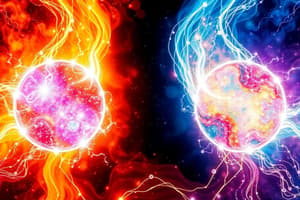Podcast
Questions and Answers
What is a redox reaction?
What is a redox reaction?
- A reaction that involves only oxidation
- A reaction that absorbs energy
- A reaction in which electrons are transferred from the reducing agent to the oxidizing agent (correct)
- A reaction that does not involve electrons
What happens in redox reactions?
What happens in redox reactions?
Oxidation and reduction occur simultaneously.
Define oxidation.
Define oxidation.
Process by which a chemical species loses electrons.
What are oxidation reactions?
What are oxidation reactions?
Iron is found in ores containing which minerals?
Iron is found in ores containing which minerals?
What does 'reduced' mean in a redox reaction?
What does 'reduced' mean in a redox reaction?
What does 'oxidised' mean in a redox reaction?
What does 'oxidised' mean in a redox reaction?
Define reduction.
Define reduction.
What is a half equation?
What is a half equation?
What does OIL RIG stand for?
What does OIL RIG stand for?
There is an overall loss of electrons in redox reactions.
There is an overall loss of electrons in redox reactions.
Provide an example of a redox equation that doesn’t involve a reaction with oxygen.
Provide an example of a redox equation that doesn’t involve a reaction with oxygen.
What is an oxidant or oxidizing agent?
What is an oxidant or oxidizing agent?
What is a reductant or reducing agent?
What is a reductant or reducing agent?
Metals tend to be reducing agents.
Metals tend to be reducing agents.
Match the characteristics of reducing and oxidizing agents:
Match the characteristics of reducing and oxidizing agents:
The overall equation of a redox reaction shows the transfer of electrons.
The overall equation of a redox reaction shows the transfer of electrons.
What may need to be done to one or both of the half equations?
What may need to be done to one or both of the half equations?
What is a conjugate redox pair?
What is a conjugate redox pair?
Flashcards are hidden until you start studying
Study Notes
Redox Reactions Overview
- Redox reaction involves electron transfer from the reducing agent to the oxidizing agent.
- Oxidation and reduction are simultaneous processes occurring in redox reactions.
Key Definitions
- Oxidation: The process of losing electrons by a chemical species, such as metal atoms or non-metal ions.
- Reduction: The process of gaining electrons by a chemical species.
Reaction Characteristics
- Oxidation reactions often involve oxygen as a reactant, although not all redox reactions require oxygen.
- The half equation represents the loss or gain of electrons during redox processes, ensuring clarity in electron transfer.
Mineral Sources and Examples
- Iron is commonly found in ores such as haematite (Fe2O3) and magnetite (Fe3O4).
- Example of a redox equation without oxygen:
2K (s) + Cl2 (g) ==> 2KCl (s)- Oxidation half equation: K (s) ==> K+ (s) + e-
- Reduction half equation: Cl2 (g) + 2e- ==> 2Cl- (s)
Oxidising and Reducing Agents
- Oxidising Agent: A reactant that causes another to lose electrons and is itself reduced. Example: In the reaction of magnesium with oxygen, oxygen acts as the oxidising agent.
- Reducing Agent: A reactant that causes another to gain electrons and is itself oxidised. Example: In the same reaction, magnesium serves as the reducing agent.
Properties of Agents
- Reducing Agents: Typically metals that lose electrons, reduce oxidising agents, and undergo oxidation.
- Oxidising Agents: Typically non-metals that accept electrons, oxidise reducing agents, and undergo reduction.
Additional Concepts
- There is no overall loss of electrons; instead, they are transferred between atoms, reinforcing simultaneous oxidation and reduction.
- The overall equation of a redox reaction may not explicitly show the transferred electrons.
- Half equations may require multiplication to balance electrons, ensuring they cancel out in the overall equation.
Conjugate Redox Pairs
- A conjugate redox pair consists of an oxidising agent and its corresponding reduced agent, often denoted in the format oxidant/reductant. Example: Cu²⁺/Cu.
Studying That Suits You
Use AI to generate personalized quizzes and flashcards to suit your learning preferences.




